- Raising Brilliance
- Posts
- 7 Creative Ways to Find Autism Support Groups That Will Change Your Life
7 Creative Ways to Find Autism Support Groups That Will Change Your Life
Discover 7 creative ways to find autism support groups, build connections, and empower your autism journey with expert tips and resources.
Why Finding the Right Autism Support Groups Can Transform Your Family's Journey
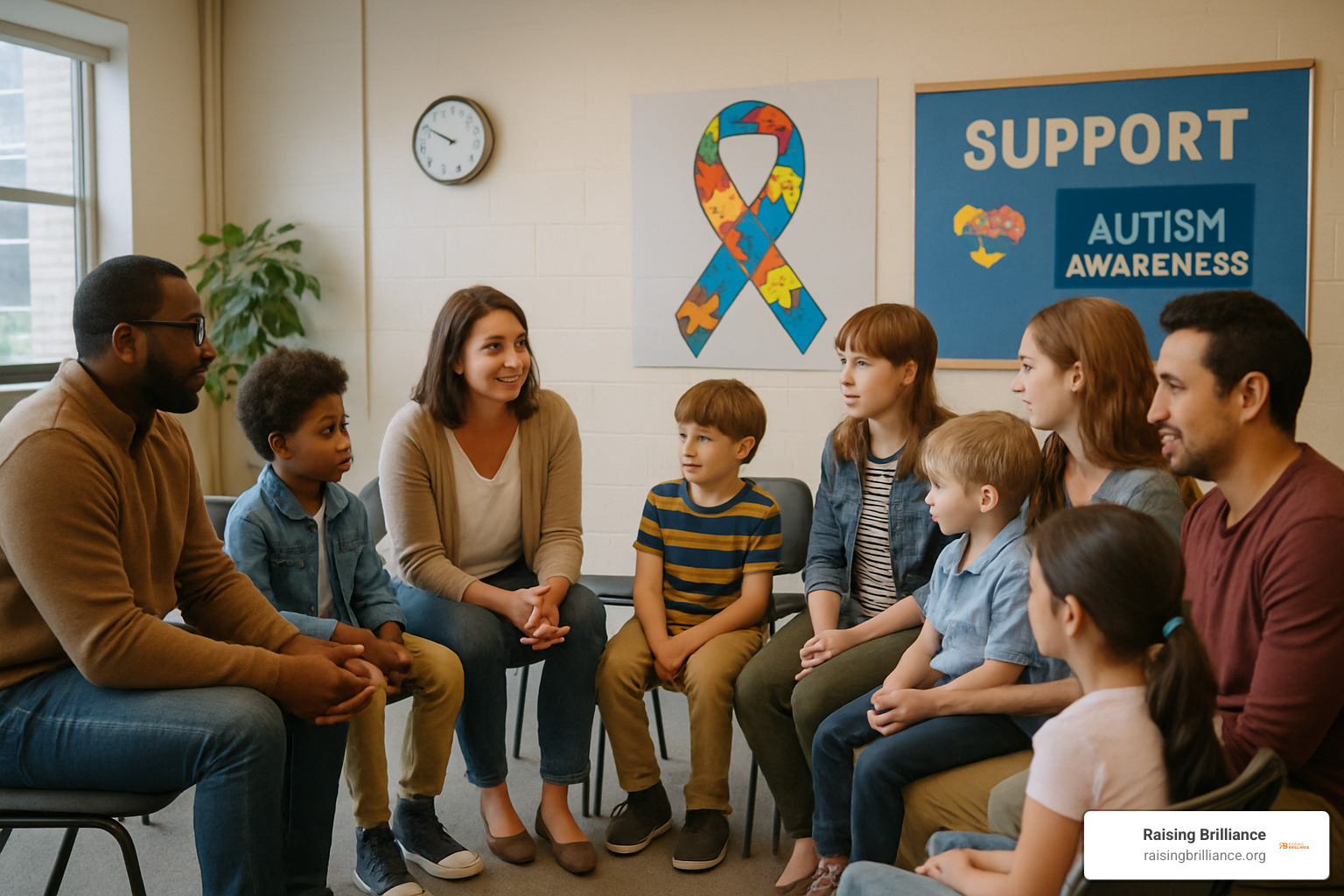
Autism support groups connect families and individuals with peers who truly understand their experiences, offering emotional support, practical advice, and a sense of belonging that can be life-changing.
Quick Guide to Finding Autism Support Groups:
National Resources: Start with Autism Speaks Autism Response Team (ART) - handles 20% of inquiries about community support
Online Communities: Join platforms like AANE discussion forums, GRASP virtual groups, or Facebook communities
Local Options: Check with schools, regional centers, hospitals, and faith communities for in-person meetings
Identity-Specific Groups: Look for culturally competent options (Black, Hispanic, LGBTQIA+, faith-based communities)
Hybrid Formats: Combine support with activities through community walks, Special Olympics, or recreational programs
Finding the right support network isn't just about getting information - it's about finding you're not alone in this journey. Whether you're a parent feeling overwhelmed by your child's recent diagnosis or an adult seeking peer connections, the right group can provide the understanding and practical guidance that makes all the difference.
The challenge is knowing where to look. With thousands of autism support groups across different formats, age groups, and communities, it's easy to feel lost before you even begin.
The good news? There are creative ways to find groups that match your specific needs, schedule, and comfort level. From tech-savvy apps that connect you instantly to faith-based communities that honor your values, the perfect support network is out there waiting for you.
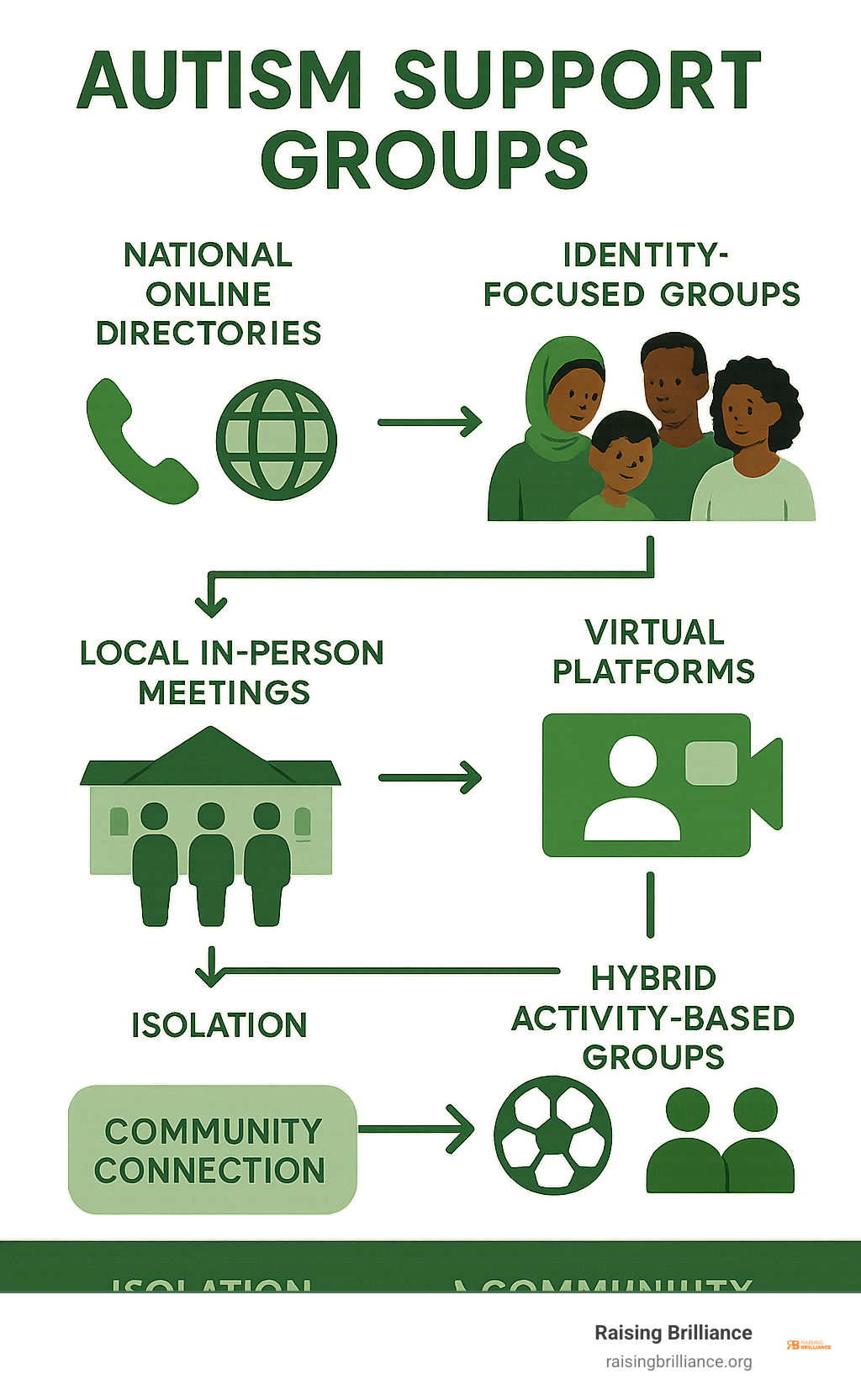
1. Start with Trusted National Resource Guides and Hotlines
When you first start hunting for autism support groups, let the big national organizations do the heavy lifting.
Why National Directories Matter
Over 20 percent of calls to the Autism Speaks Autism Response Team (ART) are versions of one question: “Where can I meet other families like mine?” Vetted national listings answer that fast and safely, so you’re not guessing whether a random Facebook page is legit.
Autism Speaks Resource Guide – searchable by ZIP code, age, and topic
AANE (Asperger/Autism Network) – separate forums for parents, teens, adults, and partners
GRASP – 20-year history, virtual and identity-based meetings
Quick Tips for Using Directories
Filter by state first, then pick online or in-person.
Note “open” (walk-in) vs. “closed” (registration required) groups.
Email the listed contact; ask about size, focus, fees, and whether you need to RSVP.
Five minutes of prep can save a wasted trip and match you with a group that aligns with your family’s goals—whether that’s practical IEP talk or pure emotional support.
2. Dive Into Online-Only Autism Support Groups for 24/7 Connection
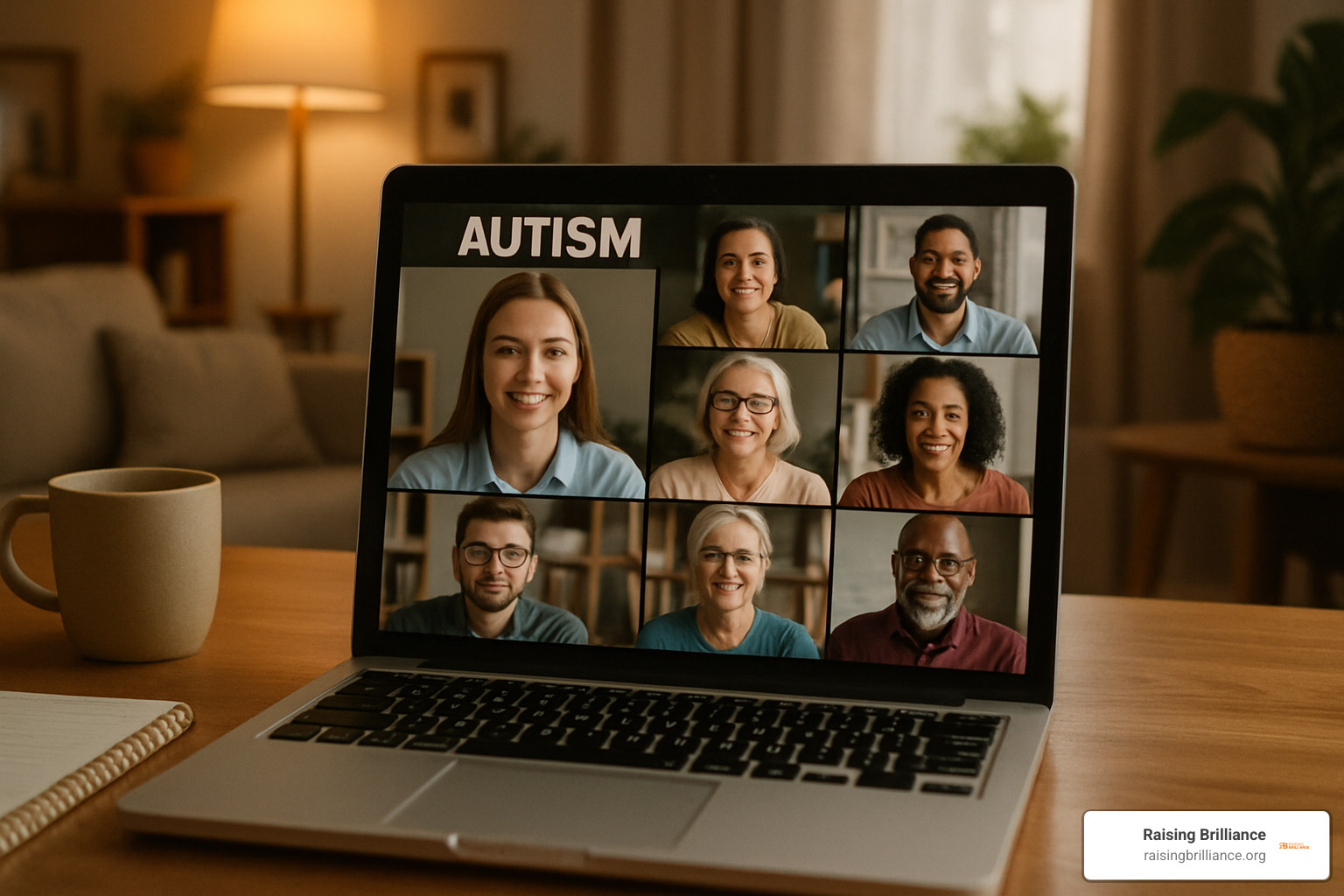
Whether you’re up at 2 a.m. worrying about an IEP or sneaking a break at work, online autism support groups are always open.
Platforms Worth Trying
AANE Google Groups – staff-moderated lists by life stage
GRASP – weekly Zoom meet-ups plus Women & Non-Binary and LGBTQIA+ rooms
MyAutismTeam – social-app feed with 180,000+ members
Private Facebook or Discord servers – easy if you already use the app
For more digital ideas, see our guide on Autism Educational Resources.
Smart Privacy Habits
Group Type | Privacy | Pros | Cons |
|---|---|---|---|
Open | Low | Join instantly | More spam |
Closed | Medium | Screened members | Approval wait |
Secret | High | Invite-only | Harder to locate |
Use a separate email or alias, read the rules, and choose groups with active moderators. If the tone doesn’t feel welcoming within a few scrolls, leave and try another—there’s no shortage of options.
3. Seek Out Identity-Focused & Culturally Competent Communities

Autism intersects with culture, language, race, gender, and faith. Groups that reflect those layers let you focus on support instead of explaining background.
Why It Matters
Language access – meetings in Spanish, Mandarin, ASL, and more
Shared values – faith or extended-family dynamics are understood
Lower stigma – members have lived the same intersectional challenges
How to Find Them
Search “autism support” plus your identity keyword (e.g., “Black autism parents,” “Latinx autismo grupo,” “LGBTQIA autistic adults”). GRASP hosts Black & Indigenous, LGBTQIA+, and over-50 channels, and many cultural centers or places of worship run informal circles that never make it into national directories.
Technology has completely changed how we find autism support groups - and honestly, it's about time! Gone are the days of hoping to stumble across the right group through word-of-mouth or endless Google searches. Now, we can connect with our people from the comfort of our couch, often with just a few taps on our phone.
Creating Genuine Connections Through Tech
Here's what makes modern autism support apps so much better than the old "post on a bulletin board and hope for the best" approach. Geolocation matching means you're not just connecting with someone on the other side of the country. Apps created specifically for teens with special needs use your location to find people nearby who share actual interests.
This isn't random matching - it's smart matching. The technology considers whether you're into trains, art, music, or gaming. It looks at whether you prefer quiet spaces or active environments. Some people love video chats, others do better with text-based conversations.
Push notifications have become surprisingly helpful too, but in a gentle way. Instead of overwhelming you with alerts, good autism support apps send gentle reminders about upcoming virtual meetings, daily check-ins when you need them, and even celebration alerts when community members share good news.
For more information about how digital tools can help children with autism build connections, research shows that peer support programs can significantly improve social outcomes for individuals with autism.
Autism Support Groups You Can Join With a Tap
MyAutismTeam has created something pretty special - a mobile app that connects over 180,000 people affected by autism. What makes it work is the location-based matching for local connections combined with private messaging and group discussions.
Facebook groups have gotten much easier to steer too. You can search "autism support" plus your city name and find local options quickly. Facebook's "Groups Near You" feature takes the guesswork out of finding nearby communities.
Discord communities have become surprisingly popular, especially with younger adults and teens. The real-time chat during difficult moments can be incredibly comforting. Voice channels work well for people who prefer talking over typing.
The key is finding platforms that match how you naturally communicate. Start by downloading 2-3 different apps to try different formats. Set up your profiles with appropriate privacy settings, then join 3-5 groups initially to compare the vibes.
5. Connect Through Schools, Clinics, and Faith Communities

The most valuable autism support groups often come from the most unexpected places. While we're busy searching online, some of the best connections are waiting for us in the places we already visit - our child's school, the therapy clinic, or even our local community center.
Asking Professionals for Support Group Referrals
Your child's IEP team members are sitting on a treasure trove of information about local autism families. The special education teacher who works with your child has probably heard every challenge you're facing from other parents too. Don't be shy about asking them during your next meeting if they know of any parent support groups.
These professionals can point you toward district-wide autism family networks that meet regularly, or parent groups that gather right at your child's school. Some districts even host monthly coffee meetups where autism parents can connect while their kids are in class.
Therapists and clinicians often know about groups that match your specific situation. Your child's speech therapist might know of a group for parents dealing with communication challenges, while the occupational therapist could connect you with families working on similar sensory issues.
Hospital and clinic social workers maintain extensive lists of community resources, including support groups you'd never find through Google searches. They know which groups are welcoming to new members, which ones provide childcare, and which groups meet at times that work for busy parents.
For more guidance on working effectively with these professionals, our Parent Training Programs for Autism resource offers helpful strategies for building these important relationships.
Turning Existing Spaces Into Support Hubs
Libraries have become unexpected champions of autism support. Many public libraries offer free meeting rooms that local support groups use, and librarians often know which groups are looking for new members. The beauty of library-based groups is that they provide quiet spaces perfect for sensory-sensitive individuals.
Faith communities represent another untapped resource for autism support. Even if your church, synagogue, mosque, or temple doesn't currently have an autism support group, many religious leaders are eager to help their congregations connect with each other.
Community centers and recreation facilities frequently host autism programming that includes family support components. If your child participates in adaptive sports or special needs recreation programs, other parents are right there waiting to connect.
The major advantage of connecting through these existing institutions is convenience and trust. You're already comfortable with these places, and they often provide practical benefits like free meeting spaces, professional guidance, and childcare during meetings.
6. Launch Your Own Peer-Led Autism Support Group
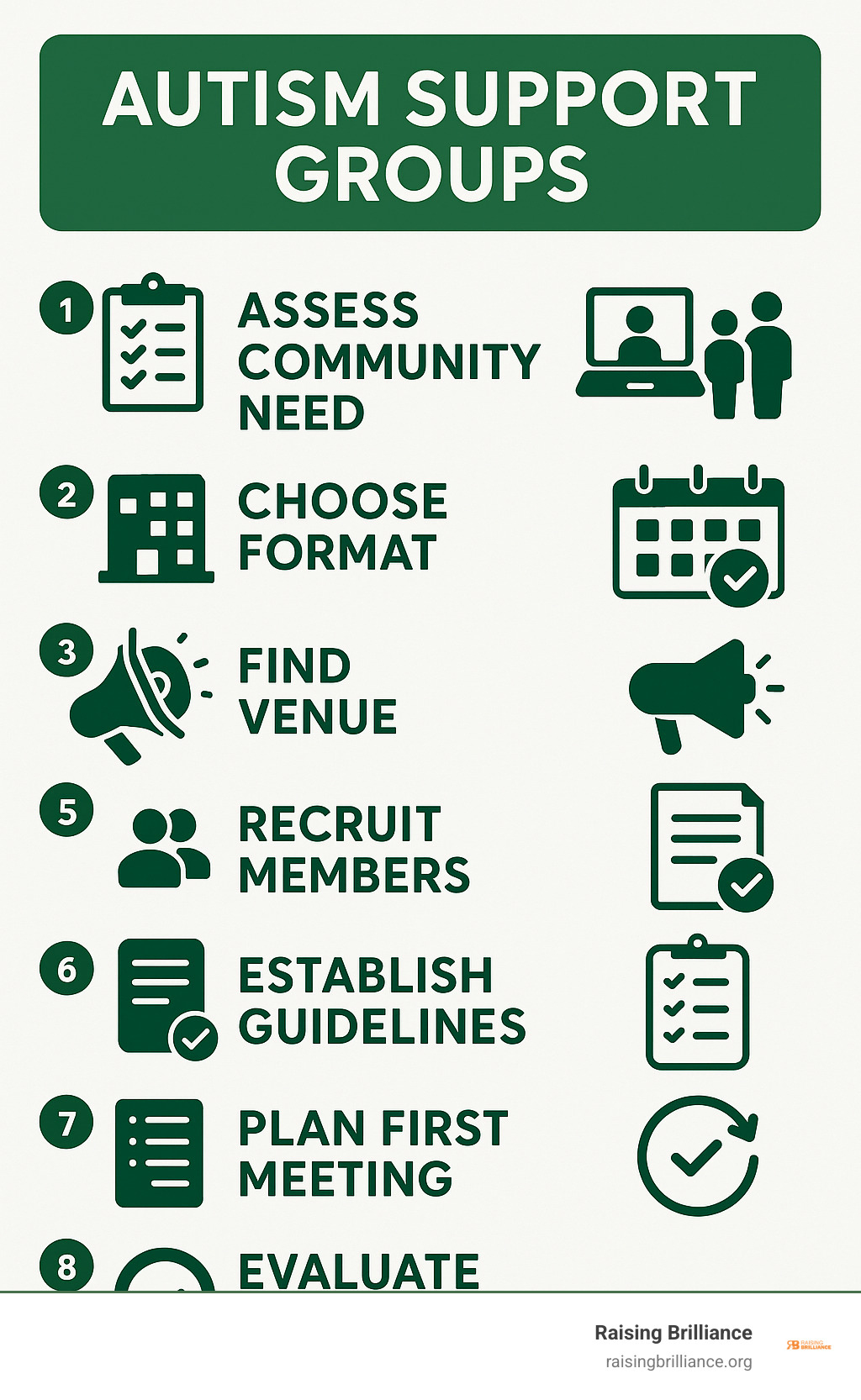
Can’t find a perfect fit? Start one! You don’t need to be an expert—just organized and welcoming.
Ask around (school, therapy clinics, social media) to gauge interest.
Pick a format: free virtual platforms like Zoom, or in-person at a library room.
Meet monthly for about 90 minutes; provide childcare if possible.
Set ground rules on confidentiality and respect.
Recruit a co-facilitator so the group survives illnesses or busy seasons.
Typical costs are minimal: library rooms are free, snacks run $10-20, often covered by optional $5 donations. For moderation tips, see our guide on Neurodiversity Advocacy.
The payoff is huge—watching parents trade numbers, teens plan hangouts, and everyone realize they’re not alone.
7. Combine Support with Fun: Hybrid Events & Recreational Programs
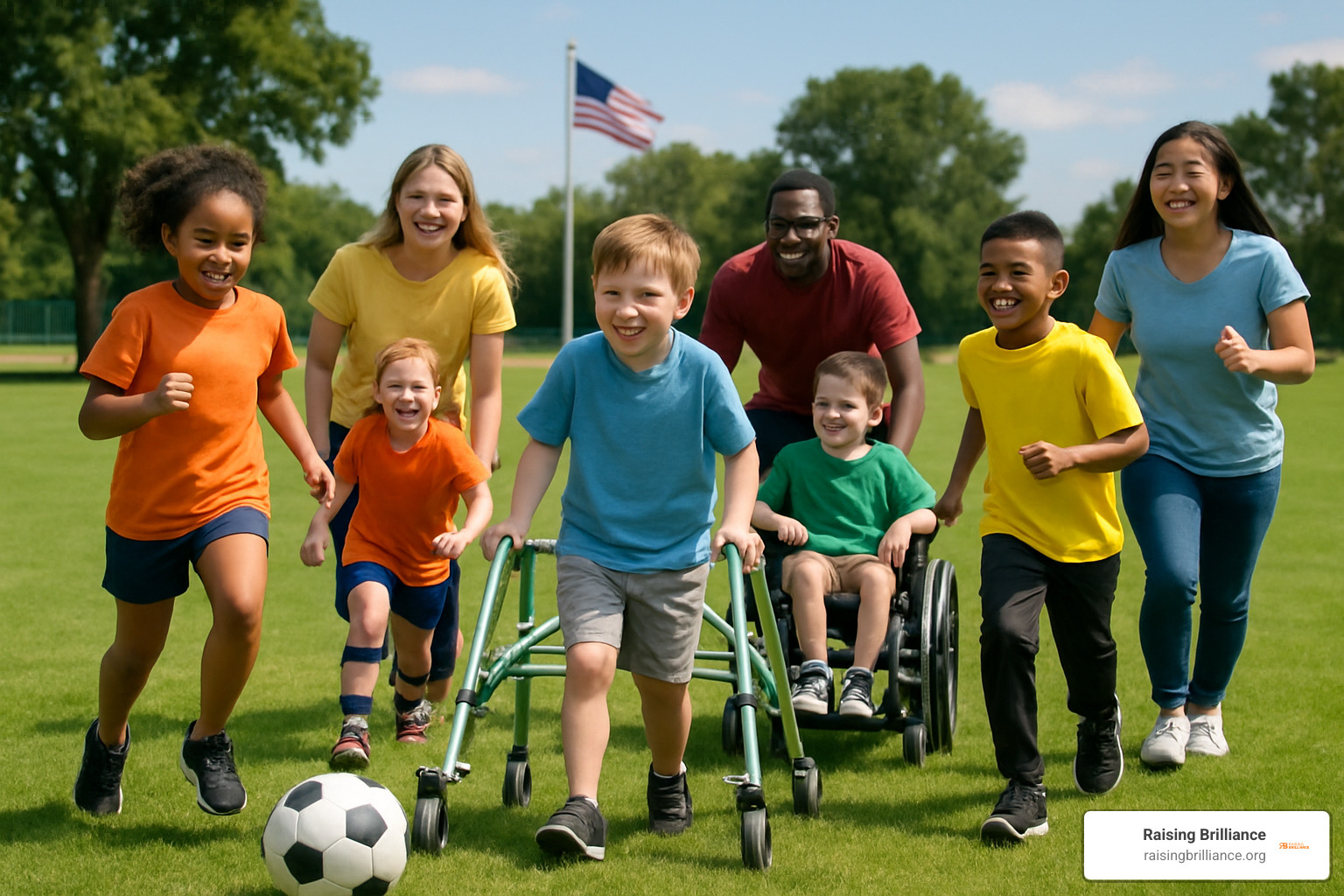
Here's a secret about autism support groups: some of the best ones don't feel like support groups at all. They're soccer practices where parents naturally bond on the sidelines. They're art classes where families connect over paint-splattered smiles. They're community walks where thousands of people come together and suddenly you realize - we're not alone in this.
How Activity-Based Groups Build Social Skills
Community walks happen across the country every year, and they've become so much more than fundraising events. Picture this: thousands of families wearing matching t-shirts, kids running around with face paint, parents swapping phone numbers while their children play together. The conversations flow naturally because everyone's in a good mood, everyone belongs, and there's no pressure to share anything you're not ready to discuss.
What makes these events powerful is how they build connections through shared joy rather than shared struggles. When your child scores their first goal in Special Olympics soccer, the other parents cheering aren't thinking about IEP meetings or therapy schedules - they're just celebrating with you.
Adaptive sports programs understand this perfectly. During practices and games, parents naturally gather and connect. Kids learn teamwork, develop physical confidence, and make friends who understand them. Meanwhile, families build their own support networks without even realizing it's happening.
Creative programs work the same way. Arts therapy groups bring families together around music, painting, and theater. When everyone's focused on creating something beautiful, conversations about autism feel less heavy and more hopeful.
Finding Hybrid Groups Near You
The trick to finding these gems is knowing where to look and staying connected to the right information sources. Event calendars become your best friend - not just for the big annual events, but for the smaller community programs that pop up throughout the year.
Check with your local recreation centers. More communities are offering autism-friendly programming than ever before, from sensory-friendly story times at libraries to adaptive swimming lessons at community pools.
Subscribing to newsletters from autism organizations gives you the inside scoop on new programs before they fill up. Many of the best programs have limited spots and fill quickly, so advance notice makes all the difference.
Don't overlook therapeutic horseback riding, martial arts programs with autism-experienced instructors, or even bowling leagues designed for neurodiverse participants. These programs often become tight-knit communities where families support each other naturally.
The beautiful thing about activity-based support is that it works for families who might feel intimidated by traditional support groups. If sitting in a circle discussing challenges feels overwhelming, cheering at a baseball game or creating art together might be the perfect entry point into community connection.
Frequently Asked Questions about Autism Support Groups
Finding the right autism support groups brings up lots of practical questions. We've gathered the most common concerns families share with us, along with honest answers that can help you make informed decisions about joining a support community.
What are the costs to join most autism support groups?
Here's some great news: the vast majority of autism support groups won't cost you a penny. Organizations like AANE, GRASP, and most local chapters keep their support groups completely free because they understand families are already stretched thin with therapy costs and other autism-related expenses.
Most online discussion forums and Facebook groups are free to join. The same goes for peer-led support groups that meet in libraries, community centers, or schools. Even virtual support groups through established organizations typically don't charge fees.
Some specialized options do have costs. Activity-based programs that include meals or special materials might charge between $10-50 per session. Professional-led groups with licensed therapists can run $20-75 per session, though many insurance plans cover these.
The bottom line? Don't let cost concerns stop you from exploring support options. The free groups are often just as valuable as paid ones, and many organizations work with families who need financial assistance.
How do I know if a group is the right fit for my family?
Finding your perfect autism support group usually takes some trial and error - and that's completely normal. Think of it like dating, but for finding your support tribe.
You'll know you've found a good match when you feel comfortable asking questions without judgment, when other members share similar experiences to yours, and when you leave meetings feeling supported rather than drained. The group's approach to autism should align with your family's values.
Watch out for red flags like pressure to try specific treatments, gossip about other families or professionals, or one or two people dominating every conversation. Lack of confidentiality is a serious concern, as is any discrimination about different approaches to autism support.
Give each group a fair chance by attending at least 3-4 meetings before making your decision. Group dynamics change from week to week, and your comfort level will naturally increase as you get to know people.
Can support groups help with transition to adulthood challenges?
Absolutely! Autism support groups can be lifesavers during the transition to adulthood - a time when many families feel lost as their children age out of school-based services.
Adult-focused virtual support groups where members discuss workplace challenges, independent living strategies, and relationship guidance become invaluable when you're navigating uncharted territory.
Transition-specific topics that come up regularly in these groups include understanding adult service systems, employment preparation, college planning, developing self-advocacy skills, and healthcare transitions from pediatric to adult providers.
The peer support aspect is particularly powerful during transitions because other families can share what actually worked for them versus what looks good on paper. They'll warn you about common pitfalls, celebrate successes with you, and provide emotional support when things don't go as planned.
Conclusion
Finding the right autism support groups doesn't have to feel like searching for a needle in a haystack. The truth is, there's an entire community of families and individuals who share your experiences, understand your challenges, and celebrate your victories. They're waiting to welcome you - you just need to know where to look.
Throughout this guide, we've uncovered seven pathways that can lead you to meaningful connections. National resource guides give you that solid foundation to start from. Online communities mean you're never truly alone, even at 3 AM when worries keep you awake. Identity-focused groups honor who you are beyond autism, while technology tools make connecting as simple as tapping your phone.
Sometimes the best support comes from places you'd never expect. Your child's school, your local library, even your place of worship might be hosting the perfect group for your family. And if you can't find what you need? Creating your own autism support group might be the most rewarding thing you ever do.
What surprises many families is how much joy can come from activity-based groups. There's something magical about cheering for your child at an adaptive sports event while naturally connecting with other parents who just get it.
The journey to finding your community might take some time. You might try a few groups that don't quite fit before finding your perfect match. That's completely normal. Every family's needs are unique, and the autism community is beautifully diverse with space for everyone.
At Raising Brilliance, we believe every family deserves access to support and community - which is why all our resources are completely free. Whether you're newly diagnosed and feeling overwhelmed, or you've been on this journey for years and need fresh connections, you're not walking this path alone.
Your autism support group is out there. Maybe it's meeting next Tuesday at your local library. Maybe it's a Facebook group you'll find tonight. Maybe it's a group you'll start yourself next month. Whatever form it takes, that sense of belonging and understanding you're seeking? It's waiting for you.
For more guidance on this journey, explore our comprehensive Autism Parenting Tips. Every step toward community is a step toward hope, connection, and the reminder that you're raising something truly brilliant.
Your people are out there. Now you know exactly how to find them.